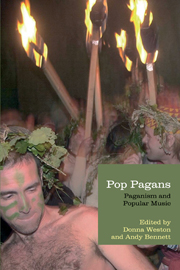Book contents
- Frontmatter
- Contents
- Contributors
- Foreword
- 1 Towards a definition of Pagan music
- Part I Histories
- 2 Paganism and the counter-culture
- 3 Paganism, popular music and Stonehenge
- 4 Rememberings of a Pagan past: popular music and sacred place
- Part II Genres
- Part III Performance
- Part IV Communities
- Bibliography
- Discography and filmography
- Index
4 - Rememberings of a Pagan past: popular music and sacred place
from Part I - Histories
- Frontmatter
- Contents
- Contributors
- Foreword
- 1 Towards a definition of Pagan music
- Part I Histories
- 2 Paganism and the counter-culture
- 3 Paganism, popular music and Stonehenge
- 4 Rememberings of a Pagan past: popular music and sacred place
- Part II Genres
- Part III Performance
- Part IV Communities
- Bibliography
- Discography and filmography
- Index
Summary
Aren't we the carriers of the entire history of mankind? … When a man is fifty years old, only one part of his being has existed for half a century. The other part, which also lives in his psyche, may be millions of years old … Contemporary man is but the latest ripe fruit on the tree of the human race. None of us knows what we know.
(Carl G. Jung, in McGuire & Hull 1977)The Romans used the term Paganus to refer to “people of place” – those whose customs and rituals were intrinsically tied to locality, and hence to land (York 2003:12). In this context, identification with place is not an individual quality, but rather a collective identity in which the significance of the individual is understood by their place in a community and that community's connection with place. Michael York describes Paganism as an inherent human impulse and a collective identity. Bringing together these two concepts of memory and place, this chapter examines how a collective cultural memory of sacredness of place might find its expression in popular music, and argues that attachment to conceptual place is the expression of unconscious “rememberings” of a Pagan past. Theories of place and cultural memory are explored, with the aim of providing a framework within which references to place and uses of space in popular music can be recontextualised. It is proposed that while contemporary Paganism in many ways draws rupture between people and nature – and, by extension, place.
- Type
- Chapter
- Information
- Pop PagansPaganism and Popular Music, pp. 43 - 57Publisher: Acumen PublishingPrint publication year: 2013



